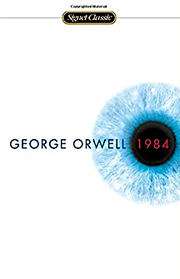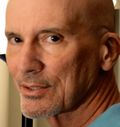A WRITER'S WIT |
My Book World

New York: Harcourt, 1949.
For summer reading in 1966, I was required to peruse Nineteen Eighty-Four for my first college humanities class, along with Huxley’s Brave New World and Salinger’s Catcher in the Rye. Sometimes a book begs to be re-read because it whispers to you. Yes, as I pass by my bookshelf words like HATE WEEK (two minutes of hate is rather like 140 characters of venom) and BIG BROTHER IS WATCHING YOU carry a familiar ring, yet as if for the first time making sense. Other Orwellian terms spring from this novel: WAR IS PEACE, FREEDOM IS SLAVERY, IGNORANCE IS STRENGTH, a language called NEWSPEAK in which words are deliberately manipulated by the government to control people’s thoughts. When I first read this book at eighteen, I did not stop to realize that the character Winston Smith, by Orwell’s own calendar, was born in 1945, a few years before me, his girlfriend Julia, in 1957. At the time, 1984 didn’t seem like eighteen years away; it seemed like FOREVER.
Now one has to wonder. Like citizens of Orwell’s London with telescreens in every room (two-way cameras), we can be hunted down at any moment by way of our cell phones, the GPS systems in our cars, the fact that a certain G entity has photographed every one of our houses and connected them to our addresses so that anyone in the world—whether a relative or an assassin—can locate us within minutes. That the government can record our telephone calls at will or monitor our Internet use are ubiquitous realities that have become invisible to us. And how much does Orwell’s term DOUBLETHINK smack of 45’s ALTERNATE FACTS, DUCKSPEAK OF #TRUMPSPEAK?
“In the end the Party would announce that two and two made five, and you would have to believe it. It was inevitable that they should make that claim sooner or later: the logic of their position demanded it. Not merely the validity of experience, but the very existence of external reality was tacitly denied by their philosophy” (80).
“the power of holding two contradictory beliefs in one’s mind simultaneously, and accepting both of them”? (214).
“It need hardly be said that the subtlest practitioners of doublethink are those who invented doublethink and know that it is a vast system of mental cheating. In our society, those who have the best knowledge of what is happening are also those who are furthest from seeing the world as it is” (215).
I purposely omit plot elements because many of you will already have read the novel, and if you haven’t, I wouldn’t want to spoil it for you. It would not be a waste of time to work it into your schedule at some point. If around today, characters Winston and Julia would be about seventy-one and sixty, yet it's hard to believe, given their plight in the novel, that they would be much more than folds of skin with hair.
NEXT TIME: New Yorker Fiction 2017



 RSS Feed
RSS Feed